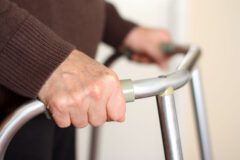Are Medication Errors A Form of Nursing Home Abuse and Neglect?

Did you know that by law, it’s permissible for nursing home facilities to have a medication error rate of 5%? That’s right—nursing home facilities are allowed a slim margin for mistakes, making it difficult for victims of these medical errors to seek justice when their loved one is harmed.
Even though nursing homes are allowed a small margin of error for dispensing prescription medications, more serious mistakes can still be classified as nursing home abuse or neglect. When a loved one is injured or killed by medication mistakes, their family is entitled to file a nursing home lawsuit against those who wronged them.
But how can you tell if a medication mistake is acceptable or something grievous enough to file suit over? And what other forms of medication mismanagement in assisted living facilities qualify as elder abuse?
Nursing Home Standards for Drug Administration
As nurses are tasked with ensuring patient safety and care, proper medication administration often carries the most significant risk. Nurses are taught to abide by the ten rights of drug administration when dispensing medications safely. Those rights include:
- Administering the right drug to the right patient
- Giving the right medication dose via the right route
- Giving the medication at the right time and frequency
- Documenting everything
- Reading the patient’s history and providing an assessment
- Accepting the patient’s right to refuse and approaching them with respect
- Understanding any possible drug interactions and evaluating how the patient responds to medications
- Educating and informing the patient
While policies may vary according to state, most facilities administer medicine only after a nurse completes a “med pass.” A med pass is a term for drug administration rounds made by nurses or nursing assistants during specific times of the day to administer medications to nursing home residents. A med pass usually involves reviewing medication orders, prepping medications, distributing them, and documenting the process.
Because administering the wrong medication or dosage can lead to potentially grave consequences for residents, it’s crucial that all nursing home staff carefully follow established protocol and safety guidelines during a med pass. This includes things such as:
- Verifying the resident’s identity
- Double-checking medication orders
- Confirming medication dosages
- Documenting administration thoroughly
Types of Nursing Home Medication Errors
Medication errors can occur in various ways, many of which could result from nursing negligence. Some of the most common types of medication errors include:
Failing to Provide Food or Antacids with a Medication
Because some medications can upset the stomach after a resident takes them, they need to be provided with food or antacids to prevent excessive discomfort.
Failing to Provide Enough Liquids with a Medication
Likewise, many medications require a certain amount of liquids to be consumed with their administration, especially those that may cause dehydration as a side effect. Without consuming the prescribed amount of fluids with certain medications, a resident may suffer from dangerous levels of dehydration.
Not Adequately Mixing, Shaking, or Rolling a Medication
Some medications, such as insulin, require shaking, mixing, or rolling before administration, and failure to do so can result in giving a resident too much or too little of it.
Cutting or Crushing a Pill
Cutting or crushing a medication that shouldn’t be touched can have potentially harmful consequences.
Not Following Tube Feeding Instructions
Because some residents receive their nutritional requirements via tube feeding, staff must ensure that proper feeding protocol is followed when administering medications.
Swallowing Sublingual Medications
If a staff member repeatedly instructs a nursing home resident to swallow a sublingual medication, it can result in too much or too little medication being administered.
Improperly Administering Eye Drops
Some eye medications require the liquid to be in direct contact with the eye for up to five minutes during administration. If done improperly, absorption can be affected, leading to injury.
When Do Medication Errors Become Nursing Home Negligence?
Nursing home negligence occurs any time a nursing home fails to meet the standards of care for its residents, resulting in injury, be it emotional or physical. Neglect can often result in failure to provide basic life necessities such as food and water, failure to prevent injury, failure to train or supervise staff appropriately, and, most importantly, failure to administer medical care and medications correctly.
Frequently, nursing home negligence results from poorly trained staff or an understaffed facility. When negligence results in its residents’ physical or emotional harm, it’s possible to hold them accountable for their actions or failure to act.
Common errors in administering medications can be classified under the realm of negligence. Such errors typically include things like:
- Incorrect medication documentation
- Failure to watch the resident after administering the medication
- Failure to abide by the correct med pass routine
- Administering expired medications
- Giving too much or too little medication to a resident
- Giving the drug in an incorrect form, dosage, time, or rate
- Administering the incorrect medication
- Laboratory errors
- Using the wrong administration technique
When is a Medication Error Medical Malpractice?
For a nursing home medication error to be considered medical malpractice, it must be proven that the nursing home owed a duty of care to the resident, that they breached that duty of care, and that the resident was injured as a direct result of their breach of duty.
There are several situations in which a nursing facility’s medication error constitutes medical malpractice. Some of these include:
Diverting a Medication
This typically occurs when a staff member steals a patient’s medication for personal use or to sell to others.
Ignoring Medical Instructions
It is considered medical malpractice when an employee willfully ignores administrative care instructions, such as changing a medication’s dosage.
Borrowing Medications From Other Residents
If a staff member borrows one resident’s medications to administer to another (if, for instance, other staff members were busy at the time of the med pass), then it becomes medical malpractice if it is not documented correctly.
Medication Mismanagement
Medication mismanagement occurs when the nursing home facility doesn’t have the correct medication available when a resident needs it.
Conclusion
When a medication is incorrectly administered to a nursing home resident, it can result in injury or death. If you or a loved one has been injured due to nursing home negligence, you have the right to file a lawsuit. Filing a lawsuit enables you to seek financial compensation for your damages and to hold those responsible accountable for their actions so that no one else’s loved one gets harmed by their reckless actions again.
If you’re ready to seek justice, hiring an experienced nursing home abuse lawyer is the best step you can take to ensure your case receives its best chance at winning. Nobody or their loved ones should have to suffer at the hands of nursing home abuse or neglect.






